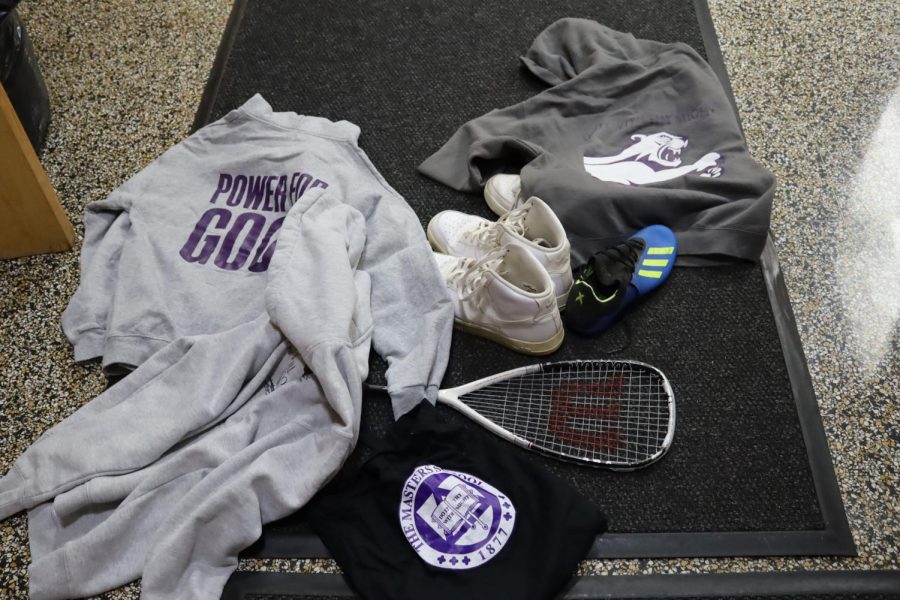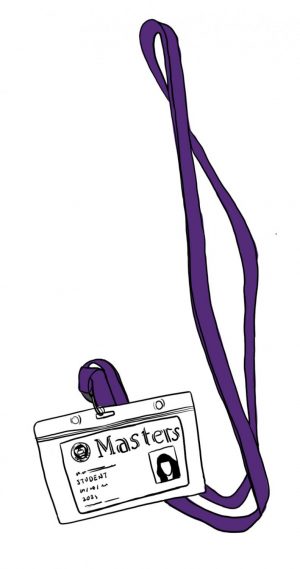Unclaimed Lost Items Find New Fate as School Year Ends
Piles of clothes are left unclaimed in a small cabinet in the lost and found. They have been in there since the beginning of the semester.
May 26, 2023
Every year, the Masters campus becomes home to a stockpile of lost possessions as hundreds of students and faculty members lose their belongings. Each time a lost item is found, it gets brought to the security office in Strayer Hall and put into an enormous closet, bursting at the seams with an assortment of forgotten memorabilia. Despite the diligent efforts to locate the rightful owners, a significant number of items remain unclaimed, leading to hundreds of shoes, shirts, sweatshirts, earbuds, pants, mugs and other items of unknown ownership still in the school’s possession at the end of the school year.
To combat this overwhelming accumulation, the security team is devising a new approach to tackle the buildup. Recognizing the need for a more manageable and efficient system, they have begun to implement a method of gradually transitioning items from the sealed, locked closet into open racks of clothes. This new approach allows community members to independently search for and reclaim their belongings without constant intervention from the security team. As the academic year draws to a close, the goal is to transform the first-floor exit of Strayer Hall into an open lost and found for items lost but never claimed during the school year.
The security team will set up multiple racks and tables, where they will notify the community that if someone has lost anything during the school year, they should come and collect it at the tables. Unfortunately, though, even implementing tables does not fully combat the issue. As Director of Safety and Security Victor Seguinot said, “In terms of lost jewelry, airpods—you can’t put that out on the table.”
Nevertheless, despite all these efforts, not all items will be collected. The school thus decides to donate these unclaimed items to charity. “If things are not claimed in a timely fashion, what happens is that—sometime in July—we have someone in the neighborhood collecting clothing for people who need it. And so, we donate it to that person. She takes it, she comes here with a van, picks everything up, and cleans up the closet for us.”
Unfortunately, the daily influx of lost items has overwhelmed the team’s capacity to manage the situation effectively. “It is hard for us to keep up with because we’re talking about every single day there is something lost, even laptops.” Seguinot said. “But, for the most part, we try to figure out what belongs to you, especially expensive stuff.” The team continues to find themselves overwhelmed and ill-equipped to handle this responsibility. Seguinot reflects, “I don’t know how security adopted this job of the lost and found. Maybe because of the fact that some stuff is expensive, I guess, but we don’t really have the time to keep up with it.”
Complicating matters further, the issue extends beyond the immediate school year. Parents sometimes contact the security team months after graduation, hoping to recover lost items belonging to their children. “We have parents calling saying, ‘My son, you know, we just realized he lost his coat, blah blah blah, do you have it here?’ And most of the times I try to keep expensive stuff here. But the stuff that we give away, we have no control of that.” Seguinot said.
He also acknowledges the challenges he faces in fulfilling this role, stating, “We definitely need to get the word out there. It’s hard for me to do because I’m not announcing this; that’s not part of my job. Sometimes they invite me to do so, but sometimes they don’t.”
One puzzling aspect of the situation is students’ apparent lack of concern from students regarding their lost belongings. Seguinot said he thinks that students from different socioeconomic backgrounds may perceive the value of lost items differently. He said “I find that some of the kids who do come looking for this stuff are probably not in the same income bracket. That makes sense, right? If you’re a kid that comes from a family with money, you tend to lose something, and it gets replaced, and no questions asked basically.”
Seguinot, who noticed the same problem upon his arrival three years ago, suggests implementing proactive measures to address the issue. He proposes making announcements about the lost and found during school assemblies, in both the Middle School and Upper School, as well as in the school newspaper. By distributing the information widely, it would improve communication within the community and ensure a smoother process for lost and found items.







